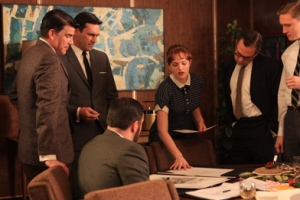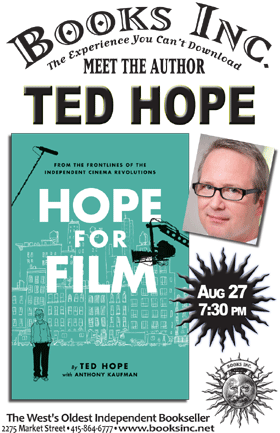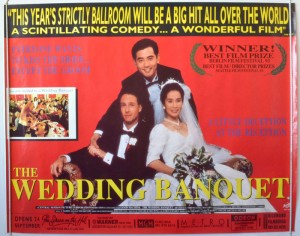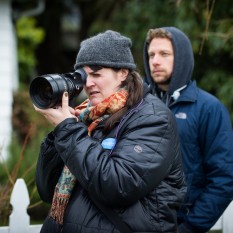 In the second episode of Season One of Mad Men, one of the copywriters is showing the agency to a new secretary, trying to impress her: “You know . . . there are women copywriters!” he claims. – “Good ones?” – “Sure,” he says. “I mean, you can always tell when a woman is writing copy. But sometimes she may be the right man for the job, you know?” Not much has changed since the days depicted in Mad Men. Or at least, not enough. This is still a man’s world – and sometimes a woman will get a writing job not because she is “the right man for the job” but because she is a woman.
In the second episode of Season One of Mad Men, one of the copywriters is showing the agency to a new secretary, trying to impress her: “You know . . . there are women copywriters!” he claims. – “Good ones?” – “Sure,” he says. “I mean, you can always tell when a woman is writing copy. But sometimes she may be the right man for the job, you know?” Not much has changed since the days depicted in Mad Men. Or at least, not enough. This is still a man’s world – and sometimes a woman will get a writing job not because she is “the right man for the job” but because she is a woman.
Category: Truly Free Film
We are on the verge of a new film culture and infrastructure.
 I hope we never run out of things that we get to do for the first time. Even more, I hope each of them is as exciting as this next one will be for me. I have never given a bookstore reading before, but I am going to do one very soon.
I hope we never run out of things that we get to do for the first time. Even more, I hope each of them is as exciting as this next one will be for me. I have never given a bookstore reading before, but I am going to do one very soon.
That’s why I write now: to invite you to the first bookstore reading of my first book. It will be on Wednesday, August 27th at 730 PM at Books, Inc. in San Francisco at 2275 Market Street.
I must confess: I am a tad nervous.
 Lending Club offers a great consumer solution — loans, lines of credit and access to capital that traditional banking and institutional lending cannot provide. Additionally — Lending Club offers individuals the opportunity to make investments through the providing of capital to said consumers. As banks continue tightening their abilities to service specific opportunities (especially those in media, entertainment & technology) — BondIt has found an opportunity to provide value and customer service in the growing independent market place. As film & media producers we knew the realities of getting a project financed, produced and recouped — it is never a pleasant ride. Combining this reality with the financial and technology background our team brought to the table — BondIt continuing to expand by offering additional services, industry value and a growing fund.
Lending Club offers a great consumer solution — loans, lines of credit and access to capital that traditional banking and institutional lending cannot provide. Additionally — Lending Club offers individuals the opportunity to make investments through the providing of capital to said consumers. As banks continue tightening their abilities to service specific opportunities (especially those in media, entertainment & technology) — BondIt has found an opportunity to provide value and customer service in the growing independent market place. As film & media producers we knew the realities of getting a project financed, produced and recouped — it is never a pleasant ride. Combining this reality with the financial and technology background our team brought to the table — BondIt continuing to expand by offering additional services, industry value and a growing fund.
 One of the pleasures of writing my book “Hope For Film” was examining many of my films for the lessons I’ve learned. The book is structured around ten core lessons although most of them include many different films. I learned a lot more than I could ever fit in one book. In going back and looking at my notes I realize of all my films, I might have learned most from Ang Lee’s 2nd film “The Wedding Banquet”.
One of the pleasures of writing my book “Hope For Film” was examining many of my films for the lessons I’ve learned. The book is structured around ten core lessons although most of them include many different films. I learned a lot more than I could ever fit in one book. In going back and looking at my notes I realize of all my films, I might have learned most from Ang Lee’s 2nd film “The Wedding Banquet”.
So what is the big difference between the film and TV industries? And why is American TV so successful? There are surely as many theories as there are shows, and they are probably all right. Still, allow me to add one more, based on one very important difference that I believe has been overlooked till now despite its enormous significance.
10 Reasons Why I Wrote A Book
Officially, my book “Hope for Film” comes out today. It’s been many years in the making though. Started and stopped, started and stopped. It was hard to get done and I feel fortunate to have found all the help I needed to get it done. I hope you like it.
But why did I write it? Here are ten reasons.
 It’s a pretty rare thing that a director has the opportunity to watch other directors at work. As a crew-member, I had a front row seat to almost every aspect of the job, pre-production through post. I never worked on a film that didn’t teach me something—whether it fell in the “to emulate” or “to avoid at all costs” column. These lessons helped me direct actors, assemble good crews, communicate effectively, have realistic expectations, and generally feel at home on a film set.
It’s a pretty rare thing that a director has the opportunity to watch other directors at work. As a crew-member, I had a front row seat to almost every aspect of the job, pre-production through post. I never worked on a film that didn’t teach me something—whether it fell in the “to emulate” or “to avoid at all costs” column. These lessons helped me direct actors, assemble good crews, communicate effectively, have realistic expectations, and generally feel at home on a film set.


